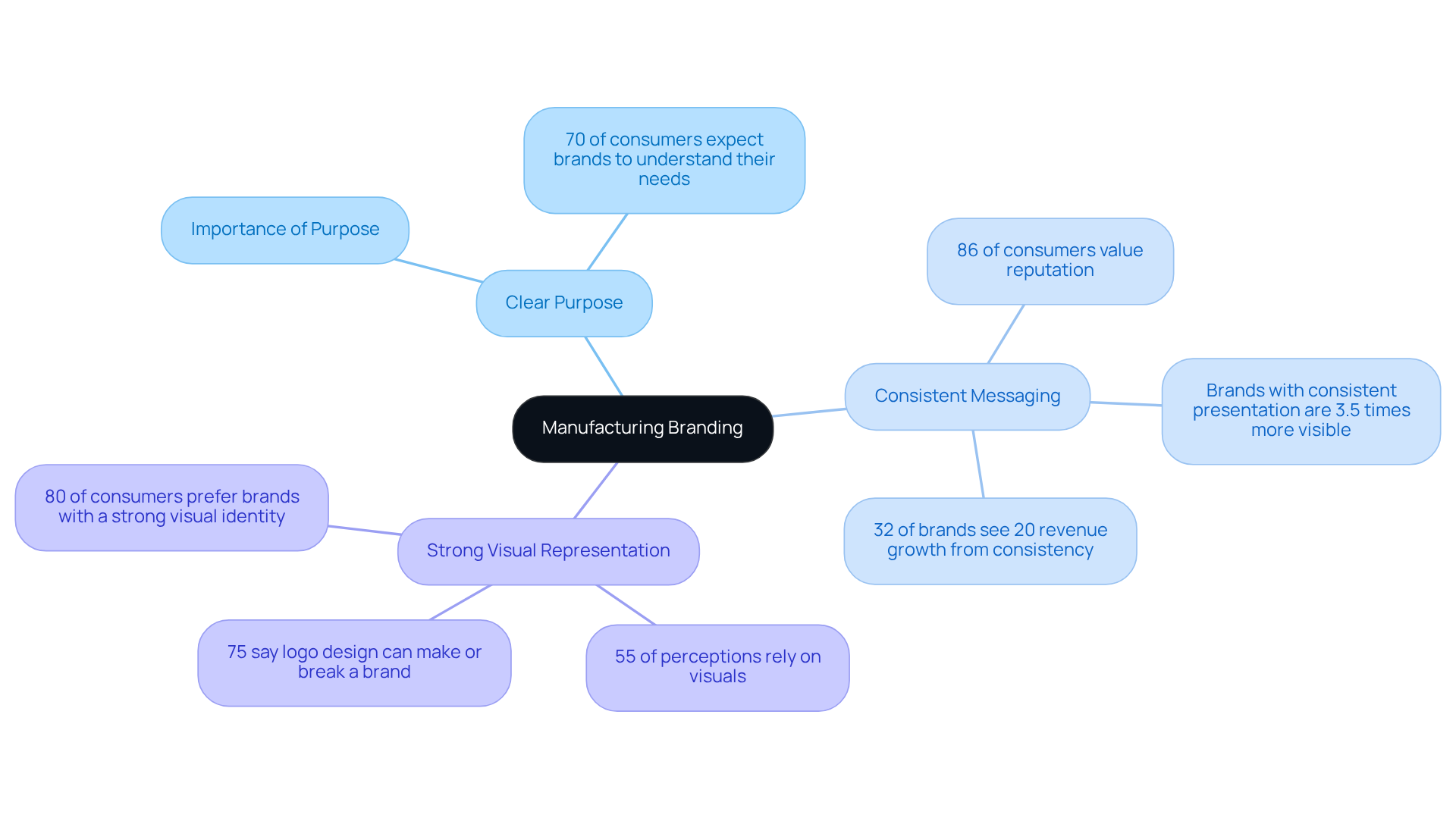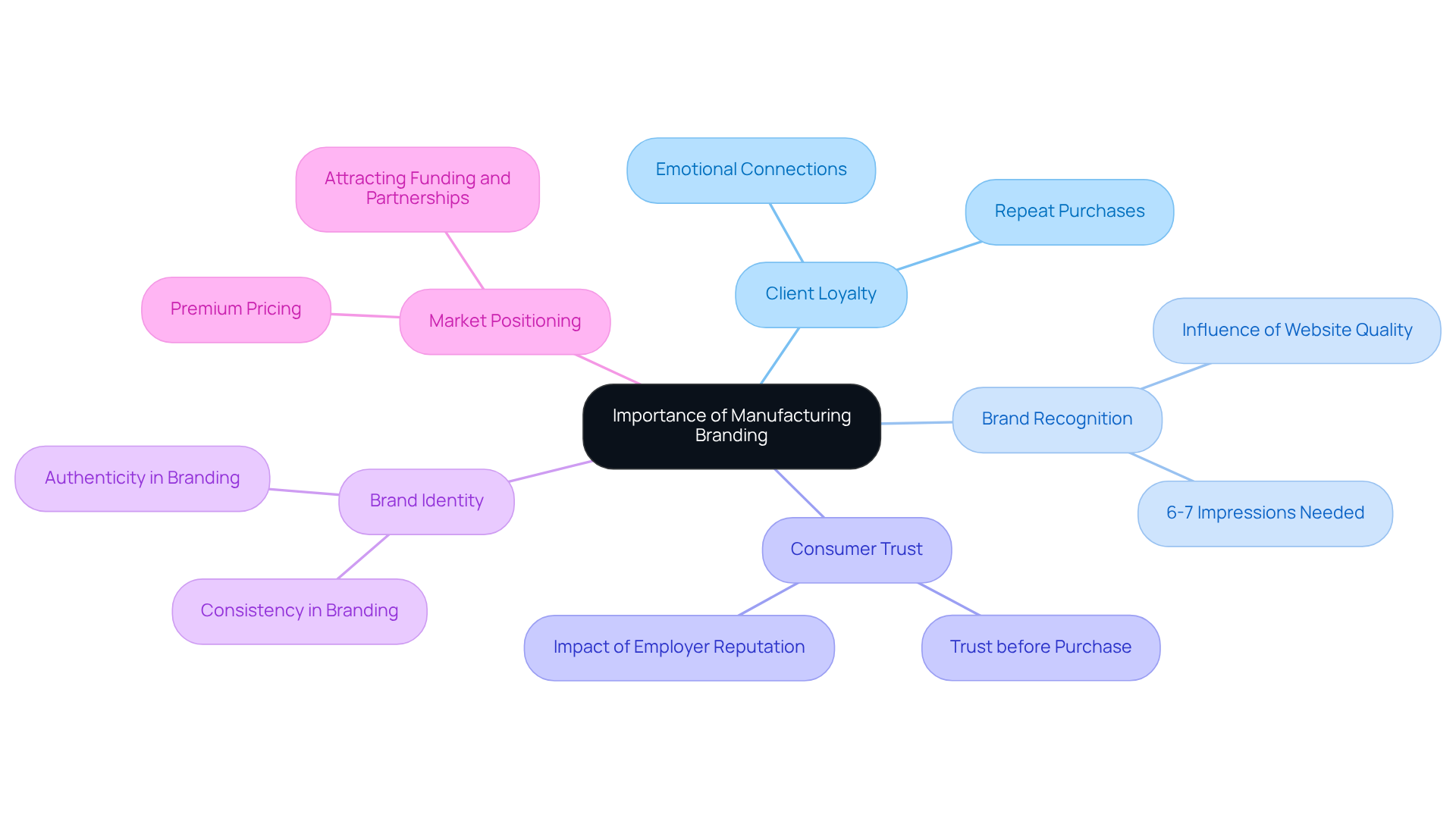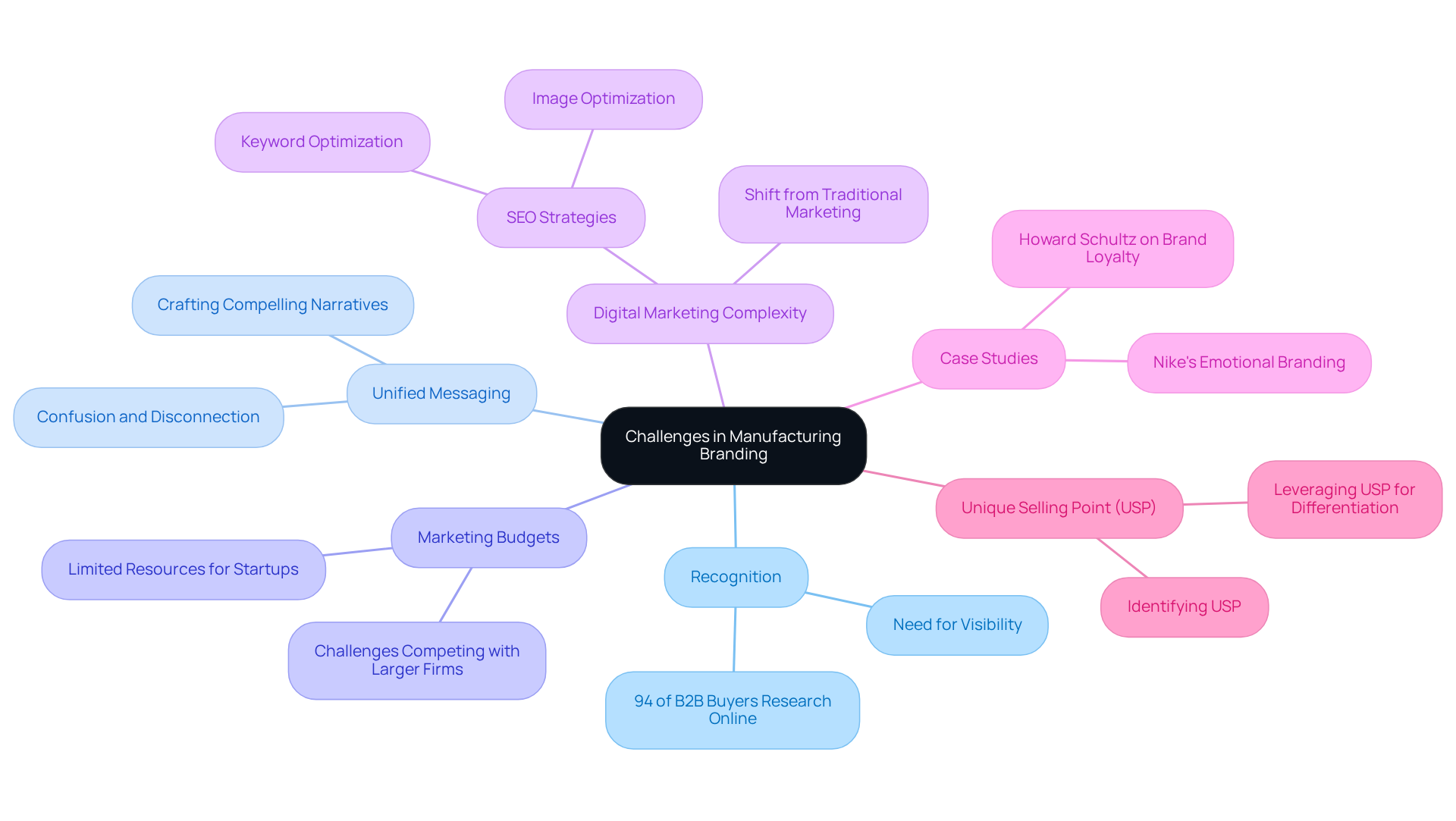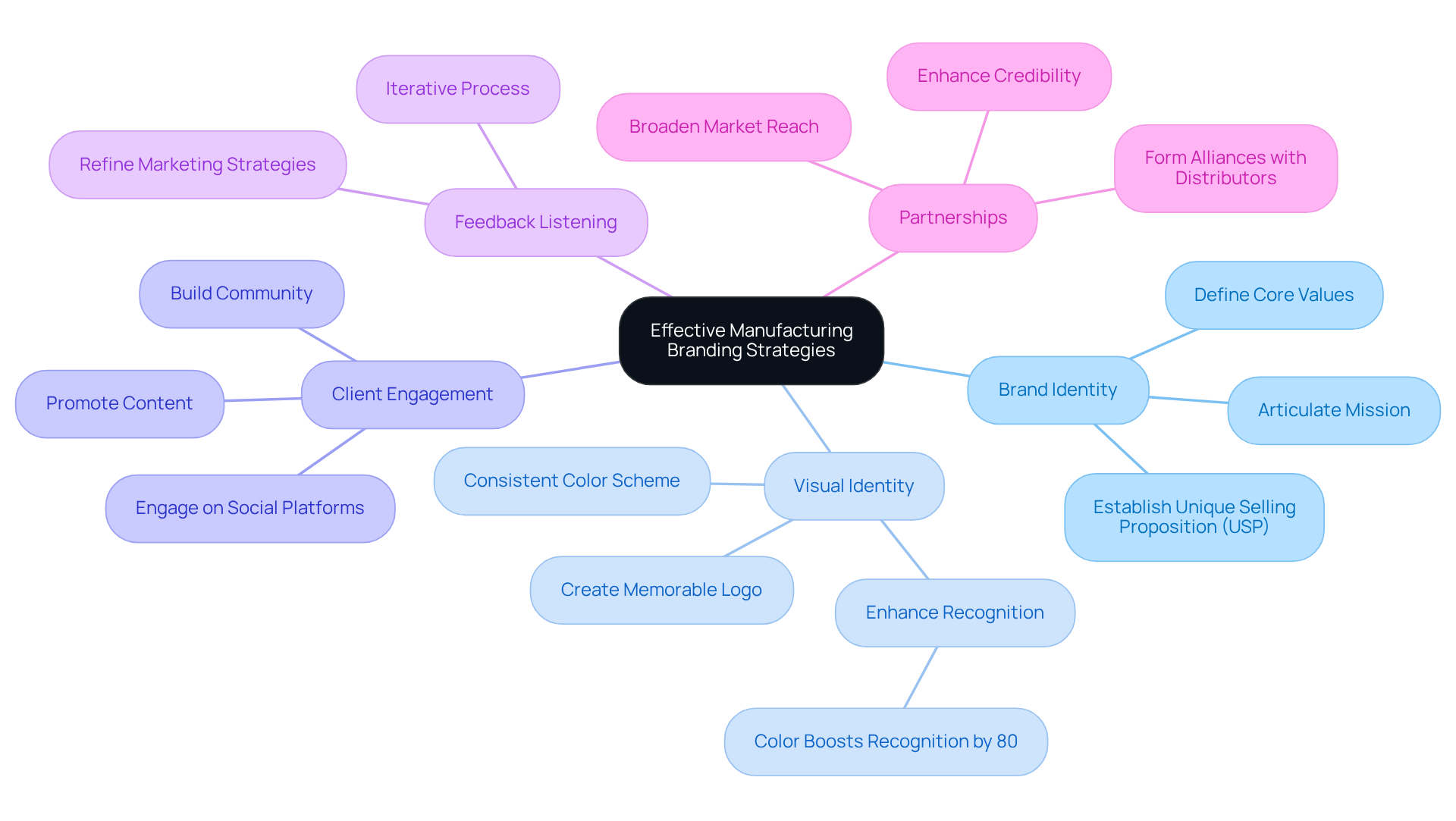Overview
For many startups, the journey of establishing a brand can feel overwhelming. In a competitive market, the challenge of creating a distinct identity often weighs heavily on founders. This struggle can lead to feelings of uncertainty, especially when considering how essential consumer trust and recognition are to success.
A strong brand identity, characterized by clear messaging, visual representation, and emotional connections, is not just a luxury; it is a necessity. It enhances visibility and fosters loyalty, which are crucial for attracting funding and forming partnerships. Ultimately, this nurturing approach to branding can drive business success.
Remember, you are not alone in this journey; many have faced similar challenges and found their way through the power of effective branding.
Introduction
Establishing a distinct identity in the manufacturing sector presents a significant challenge for startups, particularly in an industry filled with competition. Crafting a manufacturing brand goes beyond simply designing a logo; it involves effectively communicating core values, ensuring quality, and nurturing trust among consumers. Many startups find themselves grappling with the complexities of branding, leading to a pressing question: how can they truly differentiate themselves and cultivate lasting relationships in such a crowded marketplace?
This exploration of manufacturing branding not only highlights its importance but also uncovers strategies that can empower new businesses to flourish amidst the noise. Together, we can navigate these challenges and discover the supportive pathways that lead to success.
Define Manufacturing Branding
Creating a brand identity can be a daunting challenge for many producers, as it is essential to establish a distinct presence in a crowded market. This process involves not just crafting an image, but also effectively communicating your company's values, quality, and reliability to your customers. Unlike generic or private-label options, manufacturing brands are often closely associated with their names, which can foster trust and recognition among consumers. Think of well-known companies like GE and Intel; they are celebrated not just for their innovative products, but also for their unwavering commitment to quality, which has solidified their reputations in the industry.
However, many producers may struggle with how to create a memorable identity that resonates with consumers. Key elements of a successful manufacturing identity include:
- A clear purpose
- Consistent messaging
- A strong visual representation
At RNO1, we understand the importance of these components, especially in today’s e-commerce landscape. Our innovative marketing approach emphasizes design-driven solutions that enhance operational resilience and marketability. This is crucial for startups looking to differentiate themselves and build lasting relationships with their customers.
Consider this: 86% of consumers regard a company’s reputation as highly significant when making purchasing decisions. This statistic highlights the necessity for the manufacturing brand to invest in its marketing strategies. Furthermore, companies that maintain a consistent presentation are 3.5 times more likely to improve their visibility. By effectively leveraging these elements, you can stand out in a competitive landscape. Visual identity plays a pivotal role here; in fact, 55% of initial perceptions of companies rely on visual components. RNO1’s dedication to design-centric identity ensures that contemporary labels can thrive in today’s digital environment.
We invite you to reflect on your own experiences with branding. What challenges have you faced in ? At RNO1, we are here to support you on this journey, providing the expertise and nurturing approach you need to flourish in your endeavors.

Explain the Importance of Manufacturing Branding
In the world of manufacturing, a strong manufacturing brand is not just a strategy; it’s a lifeline for building client loyalty and recognition. Many businesses struggle with being remembered in a sea of options, and this can be disheartening. A well-recognized name can make all the difference, enhancing consumer recall and simplifying the decision-making process for customers. Research shows that companies must create at least six to seven impressions to effectively develop awareness, which can feel overwhelming. Moreover, a powerful brand identity fosters emotional connections, essential for nurturing loyalty and encouraging repeat purchases. It’s important to remember that 81% of consumers need to trust a company before considering a purchase, underscoring the significance of integrity in the manufacturing sector.
Effective branding serves as a beacon in a crowded marketplace, helping manufacturing brands stand out and command premium pricing. For startups, establishing a strong identity can be a game-changer, attracting funding and partnerships. Investors often seek out companies with a clear and compelling narrative. In an industry where 40% of buyers make decisions based on their perception of a website, a robust corporate identity can significantly influence customer loyalty and overall business success.
At RNO1, we understand these challenges deeply. We are here to support you in that resonates with your audience and builds trust. Together, we can navigate these complexities and foster the connections that lead to lasting loyalty.

Identify Challenges in Manufacturing Branding
Startups in the manufacturing sector often face significant challenges in establishing their identity as a manufacturing brand, with recognition being a primary concern. A staggering 94% of B2B buyers conduct online research before making purchases, which highlights the critical need for visibility in a marketplace that can feel overwhelmingly crowded, especially with established players dominating the scene. Many producers struggle to develop a unified message that resonates with their intended audience, leading to feelings of confusion and disconnection. This is compounded by limited marketing budgets, making it even more challenging for smaller companies to compete with larger firms that have more resources and established reputations.
Moreover, the complexities of digital marketing and eCommerce necessitate a departure from traditional marketing methods. This shift calls for innovative strategies that prioritize clarity, consistency, and engagement. For instance, effective use of SEO can significantly enhance a company's visibility. A manufacturing brand that optimizes its website with relevant keywords and informative meta tags can improve its search engine rankings, making it easier for potential buyers to find them.
Case studies illustrate effective strategies in overcoming awareness challenges. Take Nike's emotional branding campaigns, for example; they show how connecting with audiences on a deeper level can foster loyalty and engagement. Similarly, companies that prioritize transparency and accountability, as highlighted by Simon Mainwaring, can build lasting connections with their communities, ensuring ongoing support and trust.
To navigate these challenges, a manufacturing brand should focus on and leveraging it to stand out from competitors. By crafting compelling narratives around their products and values, they can create a strong identity that resonates with potential buyers. This approach not only fosters connection but ultimately drives growth and success in the competitive landscape of manufacturing.

Outline Strategies for Effective Manufacturing Branding
Establishing a compelling manufacturing brand identity can be a daunting challenge for startups. Many founders struggle to define what makes their brand unique, which can lead to confusion and a lack of trust among consumers. It’s essential to articulate your company's mission, core values, and unique selling proposition (USP). A clearly defined identity not only sets your product apart but also fosters trust. In fact, 82% of candidates consider employer identity and reputation before applying for jobs, highlighting how a strong image is vital in attracting top talent.
Creating a strong visual identity is another crucial step. A memorable logo paired with a consistent color scheme can significantly enhance recognition. Research indicates that color can boost recognition of a company by up to 80%, which is why it’s such an important element of your marketing initiatives. Engaging with clients through social platforms and promoting your content can also enhance visibility while building a community around your business. More than 60% of consumers have labeled a company or used a branded hashtag on social media, showcasing the potential for meaningful interaction and engagement.
Moreover, it’s important to listen to client feedback to refine your marketing strategies. This iterative process ensures that your and resonates with your audience. RNO1 emphasizes the significance of strategy activation and market adoption, guiding startups to create purposeful and profitable eCommerce experiences. Lastly, forming partnerships with distributors and retailers can broaden your market reach and enhance credibility. Strategic alliances often lead to increased trust and visibility among potential customers. By focusing on these key strategies, including RNO1's Brand Strategy & Experience Guidelines and Identity Design, startups can effectively build a manufacturing brand that truly stands out in a competitive landscape.

Conclusion
Establishing a strong manufacturing brand can feel daunting for startups striving to create a unique identity in a competitive landscape. The challenge lies not just in differentiating from generic options, but also in building trust and recognition among consumers. When startups focus on clear messaging, a compelling visual identity, and consistent engagement, they can foster loyalty and enhance their market presence, paving the way for a brighter future.
Many founders grapple with understanding consumer perceptions, which can be a source of frustration. However, investing in branding strategies is essential. Effective branding can lead to improved visibility, emotional connections with customers, and ultimately, increased sales. Companies that prioritize their brand identity often find it easier to attract funding and partnerships, which are crucial for growth and long-term success.
In a world where consumer trust is paramount, embracing innovative branding strategies that resonate with your target audience is vital. By leveraging your unique selling propositions and engaging authentically with customers, manufacturing brands can not only survive but thrive. While the journey of building a manufacturing brand may present challenges, remember that with the right strategies in place, the potential for success is limitless. You are not alone in this journey; together, we can navigate the path to a strong and impactful brand.
Frequently Asked Questions
What is manufacturing branding?
Manufacturing branding involves creating a distinct brand identity that communicates a company's values, quality, and reliability, helping it stand out in a crowded market.
Why is it important for manufacturers to establish a brand identity?
A strong brand identity fosters trust and recognition among consumers, differentiating manufacturers from generic or private-label options and enhancing their reputation in the industry.
What are the key elements of a successful manufacturing identity?
The key elements include a clear purpose, consistent messaging, and a strong visual representation.
How does RNO1 approach manufacturing branding?
RNO1 emphasizes design-driven solutions that enhance operational resilience and marketability, helping startups differentiate themselves and build lasting customer relationships.
What impact does a company's reputation have on consumer purchasing decisions?
86% of consumers consider a company's reputation highly significant when making purchasing decisions, highlighting the importance of investing in marketing strategies.
How does consistent branding affect visibility?
Companies that maintain a consistent presentation are 3.5 times more likely to improve their visibility in the market.
What role does visual identity play in branding?
Visual identity is crucial, as 55% of initial perceptions of companies rely on visual components, making it essential for effective branding.
How can RNO1 assist manufacturers in their branding journey?
RNO1 provides expertise and a nurturing approach to help manufacturers establish and flourish in their brand identity efforts.




